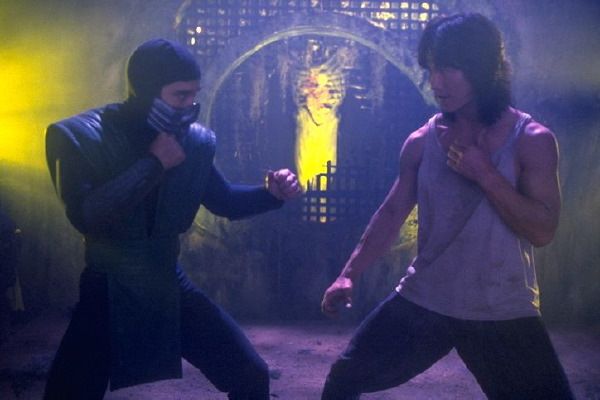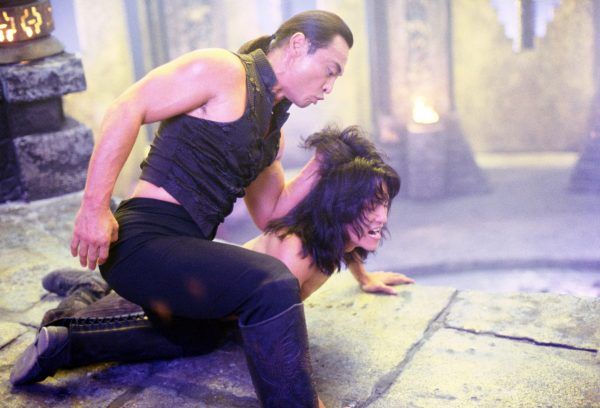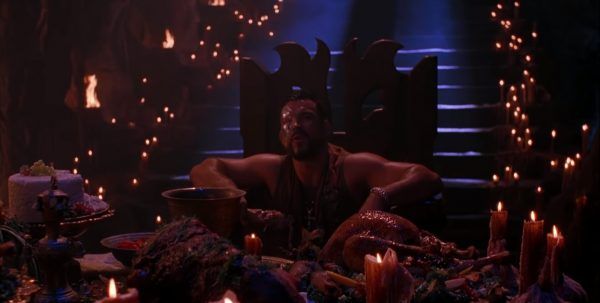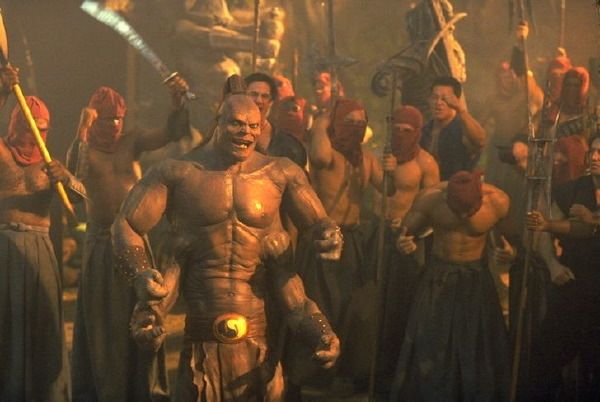It’s been 25 years since Mortal Kombat exploded into theaters like an EDM fireball launched from the fists of a Shaolin monk, blowing my 12-year-old mind straight through the back of my skull. At the time, it was easily the greatest video game movie ever made. This is largely because 1) it was only the 4th video game movie ever made, and 2) the previous two efforts had been leaky barrels of angry Donkey Kong shit. But in the quarter century since its release, we’ve seen dozens of high-profile video game movies pass through the box office, including several Laras Croft, six Residents Evil, and the continuing crimes of Uwe Boll. And not a single one of them has managed to reach the brass ring of greatness of the Mortal Kombat movie (not even Sonic the Hedgehog, despite his predilection for rings).
How can this be? Well you see, Mortal Kombat both slaps and rips, and it succeeded for a few reasons. Primarily, it nailed a very simple formula that has, to date, totally escaped almost every other video game adaptation. That formula is – just be the thing that the game is. Mortal Kombat the video game is a brutal kung fu tournament filled with crazy monsters and magical characters from another dimension, and that’s exactly what Mortal Kombat the movie is. Additionally, it benefited from being based on a game that itself was based heavily on Bruce Lee’s Enter the Dragon. All the filmmakers had to do was follow well-established tropes of martial arts movies and throw in some interdimensional goblins and karate sorcerers (which are not exactly out of place in kung fu flicks) to create a perfectly competent genre film.
To be fair, not every game has as clear a roadmap to follow. There’s a delicate balance when adapting a video game into a movie, in which you have to be recognizable enough to fans of the game while still appealing to a general audience. There hasn’t yet been a film that directly adapts every element of a game, because movies and video games are different mediums, and also because video game plotlines tend to be meandering batshit lunacy. But Mortal Kombat was the first adaptation that really attempted to retain as much of the story of the game as possible, and it managed to do so while still being a relatively straightforward kung fu action movie. Meanwhile, notorious failures like Super Mario Bros. and Street Fighter have virtually nothing to do with their source material, and instead decided to be extremely poor versions of a bizarre dystopian sci-fi film and a Thunder in Paradise sequel, respectively. More recently, the Resident Evil movies created an entirely separate storyline with almost nothing in common with the games, and the Sonic the Hedgehog movie spat out a paint-by-numbers fish-out-of-water kids movie with Sonic plopped in the middle like a spiky wet turd. Both Resident Evil and Sonic the Hedgehog were big financial successes, but I would be genuinely surprised if anyone is still talking about them in ten years. (Remember how quickly Detective Pikachu evaporated from people’s minds?) I don’t necessarily think that a video game movie can’t tell an original story within the established world of the game, but it certainly helps to have at least some fan-favorite characters and storylines represented. Mortal Kombat is faithful enough to its source material without being entirely beholden to it, which is a major reason why it’s managed to stay popular for so long – it exists entirely on its own, but is also extremely rewarding for fans. Also it features a dude doing an entire Tik Tok warm-up routine only to then immediately get frozen to death and shattered into a million pieces by a cursed ice warrior.
A major pitfall of video game movies is that they tend to be overly complicated. As I mentioned, a standard video game plot is a byzantine puzzle that almost requires constant quizzing to keep track of what’s going on, with dozens of characters and events and locales to remember. It’s extremely difficult to condense every aspect into a two-hour movie without making some sacrifices, but the key is knowing what to cut out. Mortal Kombat is an extremely uncomplicated movie, because rather than trying to include every personality and event in the series up to that point, it focused almost entirely on the original game and its relatively small cast of characters. By contrast, Street Fighter, which was released less than a year earlier, tried to give screen time to more than a dozen characters, the vast majority of whom were completely unrecognizable from their video game counterparts. It also forces in four separate storylines from the game and constantly juggles between them, resulting in a movie that was equally confusing for both Street Fighter fans and casual moviegoers. It is a movie for absolutely no one, and would’ve long since faded from memory were it not for a legendary performance from Raul Julia. He strolls through the film like a king, chewing the scenery apart while wearing fantastic outfits.
I bring this up because it leads directly into my next point. There’s a lot more involved in making an entertaining movie than just sticking to your source material if you don’t want to end up with another DaVinci Code, a film with all the charisma of a dead whale. In addition to being a reasonably faithful adaptation, Mortal Kombat is a dang blast to watch, thanks to some genuinely good and memorable performances, champion among them being Cary-Hiroyuki Tagawa as Shang Tsung. I am going to take the bold stance that roughly 80% of the reason this movie is still beloved by fans is because of Tagawa. I could write an additional 5,000 words just breaking down the incredible decisions he makes on a scene-by-scene basis.
Tagawa’s Shang Tsung glides through the film in a leather trenchcoat like a goth karate master haunting a tobacco store. He doesn’t speak his lines so much as push them out, like he’s giving birth to exposition, or trying to quietly force a record-breaking shit. Look no further than the scene in which he raises his arms to space in the middle of a black magic light show and says “It has begun!” with the facial expression of a man getting blown by an octopus. If it sounds like I’m making fun of his performance, you’re a tragic fool who has clearly never basked in its glory. This movie could’ve had zero other characters in it and still made $100 million. Tagawa is so magnetically watchable and is so committed to his role that I catch little nuances I never noticed before during every rewatch, and I’ve probably seen this movie 100 times. He commands every scene he’s in, even when he’s acting opposite a 10-foot-tall dragon man puppet. Plus he’s Swole As Fuck and knocks the shit out of Liu Kang (Robin Shou) in their final fight above a pit of spikes. You cannot say that about a single Daniel Day-Lewis performance.
Meanwhile, Trevor Goddard’s decision to play Kano as Australian permanently altered the character in the video games, who was originally Japanese-American. Ever since the film came out, Kano has been portrayed as a scumbag Australian gangster in every subsequent Mortal Kombat release. What other video game movie has had an effect on the source material like that? This is made doubly interesting by the fact that while Goddard apparently claimed to be Australian for most of his career, he was actually English. Sadly, he passed away in 2003, so we will never get to the bottom of this bizarre mystery, although we will forever admire its boldness.
And finally, Linden Ashby’s performance as conceited movie star Johnny Cage elevated the character to one of my favorites in the entire franchise. Up to this point, Cage had been depicted in the games as just a kind of blowhard asshole who was full of himself. After the movie came out, the games began to tweak Johnny Cage to be more and more like Ashby’s characterization until he ultimately became the same charming goofball with a bit of an ego he is in the film. And his fight with Goro, in which he defeats the invincible four-armed dragon prince by dropping into a Van Damme split and punching him in the interdimensional testicles as hard as he can, is an all-time movie moment. Seriously, he blows up Goro’s nutsack like an IED and kicks him off a mountain. Nobody has ever been owned so completely in cinema history. There are a number of other stand-out moments, including the scene in which Kano and Goro share an enormous Thanksgiving feast, and the appearance of two Goro superfans whose entire presence in the film consists of yelling Goro’s name into each other’s faces.
I couldn’t possibly talk about the longevity and success of Mortal Kombat without pointing out that the soundtrack fucking rips. Not only did the movie elevate the Mortal Kombat theme - which is actually called Techno Syndrome (Mortal Kombat) by The Immortals - to all-time banger status, but it also features a solid lineup of techno artists. The album is loaded with tracks by KMFDM, Traci Lords, freaking Buckethead sliding in there for a Goro-themed instrumental, Type O Negative, Orbital, and Gravity Kills, among several others. It also managed to crack the top ten on the Billboard 200 and went Platinum, which is an absolutely bonkers achievement for the soundtrack to a mid-budget video game movie. Roughly 60% of the grade school population in America owned this album. It became the soundtrack to every single one of my activities, including brushing my teeth, doing my homework, and lying in bed thinking about the Mortal Kombat movie. And yet for some goddamn reason it’s not available on any digital platform. Seriously, get your shit together iTunes.
So as I celebrate the 25th anniversary of Mortal Kombat this August by watching the movie while playing the games and listening to the soundtrack like a middle schooler on summer vacation, I invite you to do the same. We’ll meet back here in another 25 years to discuss how the film remains the best video game adaptation despite the efforts of a dozen Sonic the Hedgehog sequels and Pokemon’s Detective Pikachu: Chinatown.





